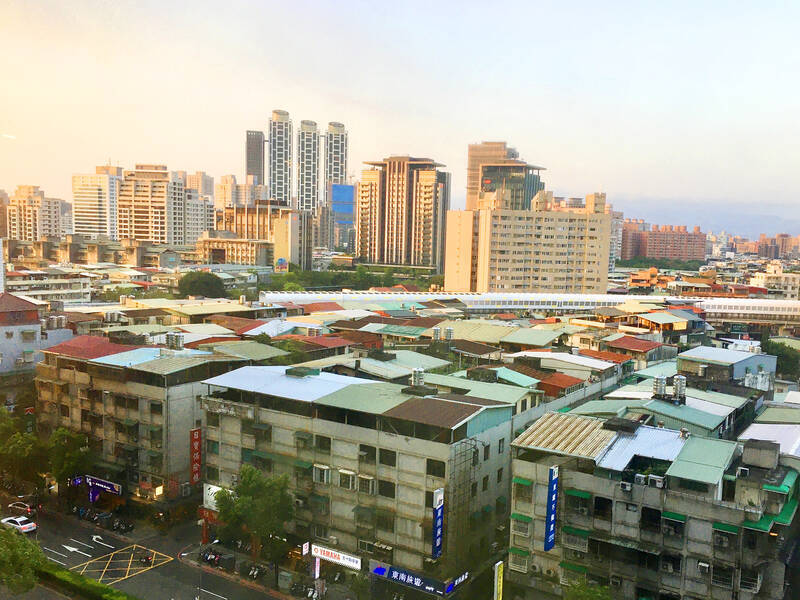Taipei Mayor Chiang Wan-an (蔣萬安) announced that Taipei would enter a “major urban renewal era” as he visited damaged buildings at the weekend.
Dozens of residents living in Zhongzheng District’s (中正) dilapidated Nanjichang (南機場) housing complex were ordered to evacuate their homes as signs of serious damage to part of the buildings’ structure were discovered after an earthquake shook the whole nation on Wednesday last week.
The housing complex was built in three phases in the early 1960s for the resettlement of thousands of residents who were forced to move due to the construction of an embankment or because they were living in illegal buildings in the area, but the living environment has deteriorated due to poor management over the years and the Taipei City Government listed it as a key urban renewal area in 2000.

Photo: Hsu Yi-ping, Taipei Times
After visiting the housing complex on Saturday, Chiang said that many columns of the building were seriously damaged on Wednesday last week, so the city government worked with civil engineers, structural engineers and geotechnical engineers and installed four H-beams to reinforce it.
Although there are still cracks in the walls and concrete scaling, the engineers on Saturday reassessed the building and deemed there to be no immediate danger of collapse, so the evacuated residents could return to their homes, he said.
“I also announced on site that Taiwan will enter a ‘major urban renewal era,’” Chiang said.
The average age of buildings in Taiwan is nearly 40 years, and 72 percent are aged 30 years or older, he said, adding that earthquakes come with no warning, so the city government would vigorously promote urban renewal.
Chiang said the city government previously launched eight measures in an effort to speed up urban renewal projects, and that it would push for more comprehensive urban renewal policies to prevent disasters.
The mayor’s announcement led to many people leaving supportive comments on his Facebook page, but some also mentioned problems and suggestions, including that the building bulk reward for urban renewal must be increased and that government intervention is needed to solve the problem of a few property owners who refuse to move.
Urban renewal should start in areas with a risk of soil liquefaction and the review process must be accelerated, they said.
Asked to comment on the Taipei mayor’s “major urban renewal era” announcement, Premier Chen Chien-jen (陳建仁) yesterday said that the Cabinet would continue to work with local governments and the civic sector to reconstruct dangerous old buildings so that people would be safe in their homes.
The urban renewal of old and unsafe buildings is especially important as earthquakes occur frequently in Taiwan, Chen said, adding that three laws regarding urban renewal were passed between 2017 and 2019, and more than 4,000 projects were approved after the laws had been enacted.

The CIA has a message for Chinese government officials worried about their place in Chinese President Xi Jinping’s (習近平) government: Come work with us. The agency released two Mandarin-language videos on social media on Thursday inviting disgruntled officials to contact the CIA. The recruitment videos posted on YouTube and X racked up more than 5 million views combined in their first day. The outreach comes as CIA Director John Ratcliffe has vowed to boost the agency’s use of intelligence from human sources and its focus on China, which has recently targeted US officials with its own espionage operations. The videos are “aimed at

STEADFAST FRIEND: The bills encourage increased Taiwan-US engagement and address China’s distortion of UN Resolution 2758 to isolate Taiwan internationally The Presidential Office yesterday thanked the US House of Representatives for unanimously passing two Taiwan-related bills highlighting its solid support for Taiwan’s democracy and global participation, and for deepening bilateral relations. One of the bills, the Taiwan Assurance Implementation Act, requires the US Department of State to periodically review its guidelines for engagement with Taiwan, and report to the US Congress on the guidelines and plans to lift self-imposed limitations on US-Taiwan engagement. The other bill is the Taiwan International Solidarity Act, which clarifies that UN Resolution 2758 does not address the issue of the representation of Taiwan or its people in

US Indo-Pacific Commander Admiral Samuel Paparo on Friday expressed concern over the rate at which China is diversifying its military exercises, the Financial Times (FT) reported on Saturday. “The rates of change on the depth and breadth of their exercises is the one non-linear effect that I’ve seen in the last year that wakes me up at night or keeps me up at night,” Paparo was quoted by FT as saying while attending the annual Sedona Forum at the McCain Institute in Arizona. Paparo also expressed concern over the speed with which China was expanding its military. While the US

SHIFT: Taiwan’s better-than-expected first-quarter GDP and signs of weakness in the US have driven global capital back to emerging markets, the central bank head said The central bank yesterday blamed market speculation for the steep rise in the local currency, and urged exporters and financial institutions to stay calm and stop panic sell-offs to avoid hurting their own profitability. The nation’s top monetary policymaker said that it would step in, if necessary, to maintain order and stability in the foreign exchange market. The remarks came as the NT dollar yesterday closed up NT$0.919 to NT$30.145 against the US dollar in Taipei trading, after rising as high as NT$29.59 in intraday trading. The local currency has surged 5.85 percent against the greenback over the past two sessions, central